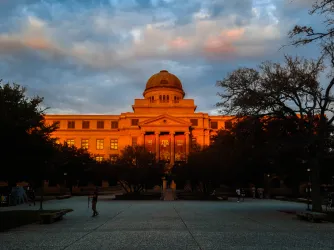Table of Contents
Medical College of Wisconsin backs out of hosting symposium citing concerns about controversial speakers

Shutterstock.com
Last week, Medical College of Wisconsin President John Raymond announced that a planned May 12 Wisconsin Association of Scholars’ Spring Symposium would no longer have a home on MCW’s campus. Discussions about the event, Raymond said, had become “too disruptive” for the university to handle and were distracting from the college’s graduation planning.
That’s right. A college that trains medical doctors and healthcare professionals — and counts many of them among its administrators — claims it can’t handle hosting a three-hour-long panel while also planning graduation.
FIRE begs to differ and has written the college to remind it of its academic freedom promises, which are binding contractual obligations under Wisconsin law. Academic freedom means MCW cannot discriminate based on viewpoint, which violates the right of students and faculty to hear competing views. But that appears to be what’s happening here.
FIRE has called on MCW to reaffirm its moral and legal commitment to academic freedom and ensure its campus has a home for the speakers invited to be there.
The WAS Symposium, scheduled for later this week, would have featured a panel discussion of diversity, equity, and inclusion programming at universities and in medical, scientific, and technical education. United States Sen. Ron Johnson of Wisconsin, state Rep. Dave Murphy of Wisconsin, and John D. Sailer, senior fellow and director of university policy at the National Association of Scholars, planned to discuss the issue and take questions from the audience. DEI initiatives are the subject of vigorous debate across the nation, and the panel was prepared to debate concerns about potential uses and abuses of power in government-mandated DEI programs at colleges and universities.
But the sudden announcement by MCW’s president that the school would “rescind the use” of its facilities for the event left WAS scrambling to find another host. Ultimately, it moved the event online and will host it via Zoom.
FIRE is increasingly worried about the suppression of viewpoints considered controversial on college campuses, including opposition to DEI initiatives. Any college whose academic freedom policy is worth the paper it’s written on would know it cannot reconcile canceling events because of potential controversies — or competing graduation-planning responsibilities — with its promises to allow open discourse and debate.
Instead of hosting the symposium and affording students and faculty the opportunity to examine and evaluate a diverse range of perspectives, the university shut down the discussion before it could even start.
Academic freedom encompasses the right for students and faculty who may disagree with a speaker’s views to ask difficult, thought-provoking questions, and colleges like MCW must train and trust their faculty and students to do so when they face views they find distasteful or offensive.
FIRE has called on MCW to reaffirm its moral and legal commitment to academic freedom and ensure its campus has a home for the speakers invited to be there.
FIRE defends the rights of students and faculty members — no matter their views — at public and private universities and colleges in the United States. If you are a student or a faculty member facing investigation or punishment for your speech, submit your case to FIRE today. If you’re a faculty member at a public college or university, call the Faculty Legal Defense Fund 24-hour hotline at 254-500-FLDF (3533). If you’re a college journalist facing censorship or a media law question, call the Student Press Freedom Initiative 24-hour hotline at 717-734-SPFI (7734).
Recent Articles
Get the latest free speech news and analysis from FIRE.

The American people fact-checked their government

Facing mass protests, Iran relies on familiar tools of state violence and internet blackouts

Unsealed records reveal officials targeted Khalil, Ozturk, Mahdawi solely for protected speech


